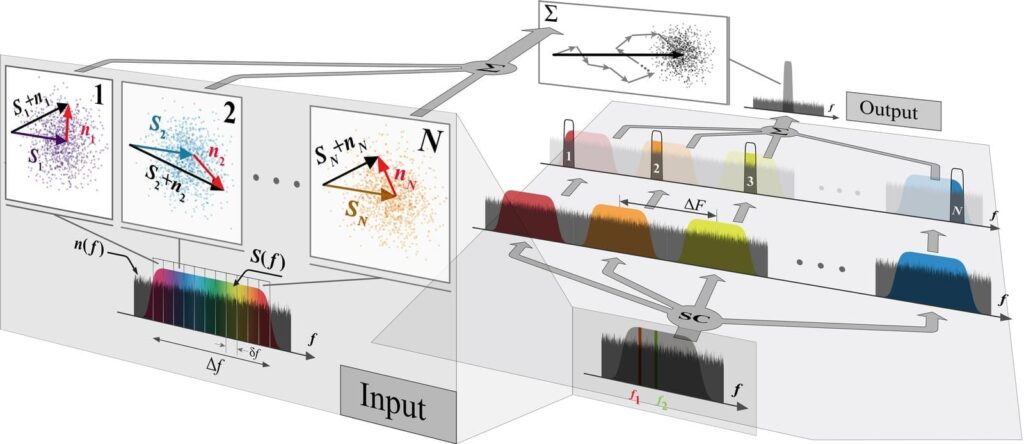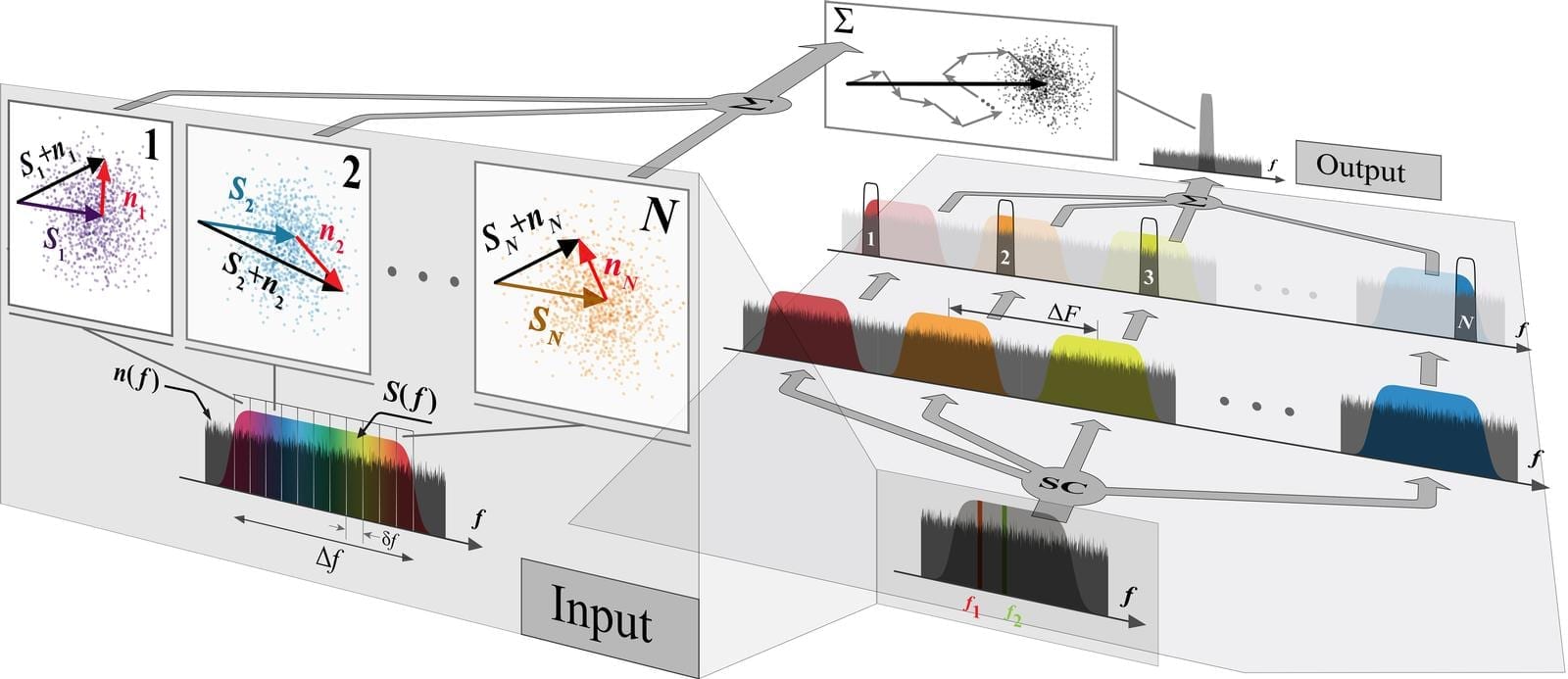
Electrical engineers at the University of California, San Diego developed a receiver that can detect a weak, fast, randomly occurring signal.
The study, published in the Dec. 11 issue of Science, lays the groundwork for a new class of highly sensitive communication receivers and scientific instruments that can extract faint, non-repetitive signals from noise. The advance has applications in secure communication, electronic warfare, signal intelligence, remote sensing, astronomy and spectroscopy.
The research is motivated by a long-standing need to capture random, singly-occurring phenomena in nature and in communications. An example of these includes the spontaneous decay of a molecule, an event that emits a single noisy signal and therefore eludes detection by conventional methods. Because a standard detector must repeat measurements of the event multiple times to confirm its existence, it prevents, in principle, the capture of a random, non-repetitive event. Another limitation is that the capture of a fast event requires an equally fast detector.
To overcome the limitations of conventional detection methods, UC San Diego researchers developed a spectral-cloning receiver that works by replicating the received noisy signal to generate multiple spectral (colored) copies, and then combines these copies to reveal the existence of the signal within the noise.
“With the new receiver, it is now possible, at least in principle, to capture an ephemeral, non-repeating signal and observe fast, sparsely occurring natural or artificial phenomena—that would otherwise be invisible to us—over a long period of time, using a slow detector,” said Stojan Radic, an electrical engineering professor in the Jacobs School of Engineering at UC San Diego and senior author of the study
In the Science paper, researchers report that the spectral-cloning receiver they developed “can potentially intercept communication signals that are presently considered secure.” These signals are based on singly-occurring bursts, which disappear before another measurement can be taken to separate noise.
Radic also noted that the receiver could enable communication at a longer distance and with higher security. For example, it would be possible to bury the communication channel in noise and still detect it using the new receiver, while being well below the sensitivity threshold of conventional detectors.
The new receiver physics can be compared to a “temporal microscope”: it can see a very fast, faint signal while observing over a much larger time interval. However, while an ordinary microscope cannot eliminate surrounding image noise, the new receiver can differentiate between the noise and the signal fields.
Read more: Noise can’t hide weak signals from this new receiver
The Latest on: Spectral cloning receiver
[google_news title=”” keyword=”Spectral cloning receiver” num_posts=”10″ blurb_length=”0″ show_thumb=”left”]
via Google News
The Latest on: Spectral cloning receiver
- The Best Rotary Laser Levels of 2024, Tested and Reviewedon May 14, 2024 at 4:16 am
It doesn’t calculate slope: We had to do the math and adjust the receiver height on the rod ... from other DeWalt tools to power this level. Spectra Precision is a leading brand in rotary ...
- Best disk cloning software of 2024on May 7, 2024 at 2:12 am
The best disk cloning software, er, clones your disks - solid state or hard disk drives - to serve as physical backups for files and folders (as with traditional backup and cloud backup software ...
- Cloningon April 21, 2024 at 5:24 am
But cloning could offer an answer. Animal cloning is becoming more common – and cloning extinct species could be on the horizon. Could parks and zoos for these creatures be round the corner?
- OpenAI reveals impressive voice cloning model, and it's scary goodon March 30, 2024 at 7:06 am
Dubbed Voice Engine, this model is quite small, which makes its audio cloning capabilities all the more impressive. OpenAI has been working on this project since at least 2022, and it's the ...
- OpenAI Debuts Voice-Cloning Tech, But Won't Release It Widelyon March 29, 2024 at 2:06 pm
OpenAI couldn’t help itself: The company has developed voice-cloning technology that’s so good it’s bound to both impress and scare users. But for now, OpenAI is only releasing the system to ...
- Animals: Receiveron February 26, 2024 at 4:12 pm
In Coney Island, N. Y., pending settlement of a suit Mrs. Little Docen last week was appointed receiver of her husband’s property listed as follows: four two-legged dogs, two six-legged sheep ...
- Twenty-Five Years After My House Call To Dolly: What Have We Learned About Cloning And How Did We Learn It?on August 2, 2022 at 8:30 am
I cover global and domestic health care and conservation. Twenty-five years ago, the scientific breakthrough of mammalian cloning marked a monumental moment in medicine and science. Anticipating ...
- An Inexpensive FM Receiver For The Raspberry Pion September 7, 2021 at 8:04 pm
[Dilshan Jayakody] recently documented his experience in designing and building an inexpensive FM Stereo Receiver for the Pi platform, and the results are impressive. Quite a few FM receiver ...
- Regen Receiver With Few Partson August 30, 2021 at 2:47 am
We like regenerative receivers. They perform well and they are dead simple to create. Example? [Radio abUse] modified a few existing designs and built a one-transistor receiver. Well, one ...
- The Cloning Processon November 5, 2018 at 4:35 pm
The cloning of embryos for generating stem cells, a process that holds promise for the future treatment of deadly diseases such as diabetes and Parkinson's, is delicate yet straightforward.
via Bing News












